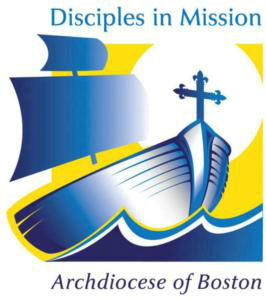What's the difference?
In the Archdiocese of Boston, as in many dioceses across the country, having one pastor responsible for more than one parish is a reality. This prompts a valid question: What is the difference between one pastor pastoring two or three parishes, and Disciples in Mission's plan to form parishes into a collaborative with one pastor?
The Introduction to Disciples in Mission states: "Disciples in Mission. ... seeks to revitalize the Church in Boston by positioning our parishes more solidly for the task of evangelization, the work of reaching out to our brothers and sisters and drawing them more fully to Christ Jesus. ..... [It]...contains recommendations to strengthen the existing 289 parishes in the archdiocese and to reorient our archdiocese to the work of evangelization. The recommendations accomplish this by building up and fortifying the ministerial and material infrastructure of our parishes so that stronger evangelization can take place. Successful evangelization is the fruit of a vital and effective communion within and among parishes. That kind of communion thrives in parish communities that are strong, stable and oriented to mission."
Notice these words: revitalizing; strengthening; building up; fortifying; mission; and evangelization, which is mentioned four times!
Participation at Mass in the Archdiocese of Boston hovers at 16 percent. There may be many reasons for this. Perhaps the poet Wordsworth, writing centuries ago, is describing today: "The world is too much with us; late and soon ... . We have given our hearts away, a sordid boon!" Whether the abysmal Mass attendance statistic is due to the world, the flesh, or the devil -- or all three -- our response cannot be limited to hand-wringing or business as usual.
The Disciples in Mission collaborative model is more than multiple parishes sharing one pastor. It also calls for sharing a pastoral team and a parish pastoral council. Working together toward a common goal -- evangelization -- the pastor, leadership team, parish staffs, and parishioners develop a Local Pastoral Plan unique to their collaborative. When parishes are united, sharing talent, ideas, energy, and faith, the task of writing the plan and achieving the goal can be energizing.
Through intentional evangelization efforts, people are invited into a deeper relationship with Jesus Christ. Parents are familiar with sacrament preparation meetings where, oftentimes, adults will give a talk about the importance of Jesus and faith in their daily life. An evangelizing collaborative prepares parishioners to give witness talks not just at sacrament preparation meetings, but at other times as well. Speaking about a personal faith becomes part of parish life.
Once a person knows Jesus, the person can learn about Jesus. A robust adult faith formation program will be a hallmark of a collaborative. When parish A and parish B just share a pastor, Parish A invites parishioners from parish B to come for the presentation at parish A. In a collaborative, parishes A and B, together, assess the needs of the whole community and together plan a program that may take place at parish A, but is the product of strategic, collaborative, planning between parishes, A and B in the collaborative.
Another important goal of the collaborative is a renewed focus on vocations, specifically to the diocesan priesthood, but also vocations in general. There should be an awareness that all parishioners in the collaborative are responsible for encouraging vocations. Parishioners in each parish are informed, celebrate, and pray for the man who goes off to the seminary, is accepted into the Permanent Diaconate program, the woman who commits herself to vowed religious life, and the couple newly married in one of the collaborative parishes.
Parishes in the collaborative will work together to adopt an attitude of "radical hospitality." One example of this is preparing for and becoming aware of newcomers at Mass, whether a new parishioner or simply someone visiting the church for Mass this Sunday. Radical hospitality isn't really radical. It is more like basic courtesy, a warm greeting before Mass, moving over in the bench and giving a nod that says, "You're welcome to sit here," not an icy look that says, "You're sitting in MY seat."
Intentional evangelization, vocations awareness, adult faith formation, and hospitality are things that many parishes are doing already; some very well. But 16 percent Mass participation suggests that we try a different approach. With God's grace, the collaborative model: a pastor supported, by parishioners from one, two, or three parishes, a collaborative team, and collaborative councils who all share the same goal and are trained for evangelization, can bear great fruit.
SUSAN ABBOTT IS COORDINATOR OF PARISH OUTREACH FOR THE ARCHDIOCESE OF BOSTON'S OFFICE OF PASTORAL PLANNING.
- SUSAN ABBOTT IS EVANGELIZATION ASSOCIATE, OUR LADY OF GOOD VOYAGE SHRINE.



















